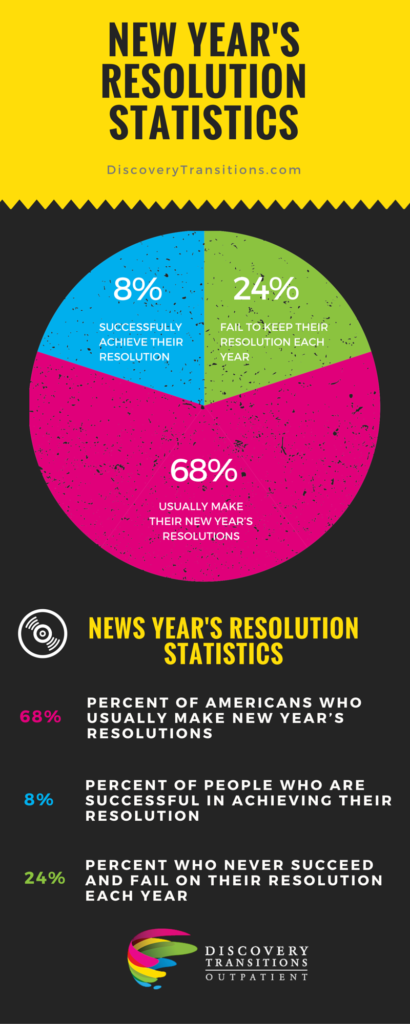New Year’s Resolutions in Recovery: Friend or Foe?
As 2015 comes to an end, and our large oversized wall calendars get replaced with 2016 calendars; a year untouched even by time-traveling deloreans, you may find yourself wanting to set goals for the next year. New Year’s Resolutions are a popular activity as these objectives can give a positive outlook of the year to come, a year of change, and success. But for those in recovery, how can a new year’s resolution affect your current treatment, and aid or disrupt you in continuing your program?
How Effective are New Year’s Resolutions?
To break this down to it’s simplest answer: It all depends on each individual’s attitude. To delve deeper, we have to dissect how each person creates and acts on their resolution. In Tasha Eurich’s article, “The Science Behind Successful New Year’s Resolutions,” she examines the different types of resolutions that people make, and which are more effective. Eurich found that many people fail at achieving their resolutions because they set goals that are unreachable or over complicated. Others who fall short of achieving their resolutions don’t make any push to actually reach their goal. This is an important factor. You cannot simply say that you are going to visit an addiction center and begin a recovery program in the year to come. You have to do the work and get up from the couch get out there! If you set a goal to stay sober through the year, you cannot assume it will just happen, you have to push yourself, and set stepping stones. It may be a simple idea, but somewhere along the way, the path to achieving our resolutions becomes rocky and steep. According to a Journal of Clinical Psychology study, only 8% of people who set up new year’s resolutions at the beginning of the year actually accomplish their mission at year-end, but those who do make a resolution have been found to be 10 times more likely to make a change in their life.

Will a New Year’s Resolution Aid my Recovery?
As stated before, a resolution has to be reachable, and has to be pursued by an individual who is willing to put the work in. Individuals who are in recovery have already showed their strength and willingness to achieve something remarkable by enrolling themselves, or participating in a program. Your goal doesn’t have to be directly related to your own drug treatment or rehab. Maybe you’re new to recovery, and want to create a resolution that will assist you in your daily struggles. Create a goal that assists your sobriety but isn’t far off. Start your resolution with a simple, short-term goal. Stay clean for a month. Once that time passes, extend that goal to 3 months, then 6, then the whole year. Stepping stones and short-term goals give us that positive feeling of accomplishment that assists in pushing us forward daily. Why not set a goal to visit a center and talk to individuals who have just begun a recovery program. Resolutions like this can reinforce your sober ideals, thus strengthening your recovery. Of course there are always chances for failure when setting up a resolution. But failure isn’t the end of the road. Failure sets us up for a retry. We know what went wrong, and this time, we won’t let it happen again. We learn more through our failures and mistakes than we do through our achievements. Without a slip up here or there, how would we know what we’re doing is wrong or right?
Set yourself a New Year’s Resolution for 2016. Make it a goal you know you can reach. Enlist others in aiding you if need be, and don’t be afraid of not achieving it 100%. A resolution is a way to enter, and end an year positively, don’t miss out on your chance to join in on these possibly life changing objectives.
If you or someone you love is struggling with an addiction as 2016 approaches, call us today at +1-(866)-916-3211 and the knowledgeable addiction specialists at Discovery Transitions will help you find an addiction recovery treatment center that works for you.



 Call
Call Text
Text